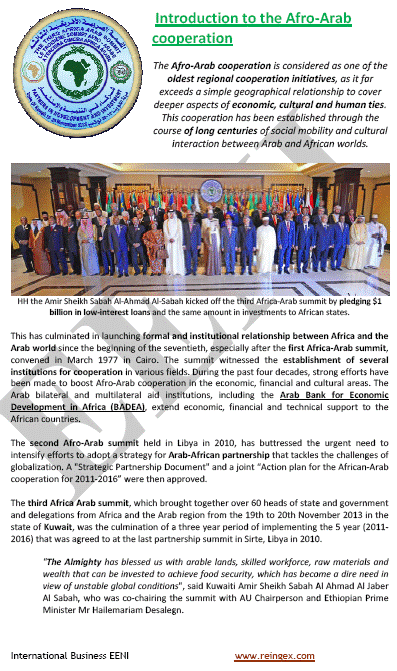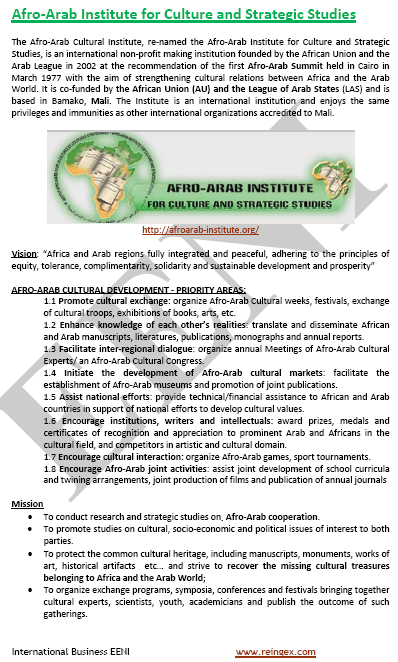Afro-Arab Cooperation, Preferential Trade Area
Afro-Arab Development Forum. Bank for Economic Development in Africa

International Relations of Africa
Cooperation between African Countries and the Arab World is based on the deep historical relations covering human, Cultural, scientific, and economic topics.
At the Third Africa-Arab Countries Summit was agreed to develop the “Afro-Arab Preferential Trade Area.”

- Introduction to the Afro-Arab Cooperation
- Afro-Arab Development Forum
- Third Africa Arab Summit
- Afro-Arab Preferential Trade Area
- Bodies of the Afro-Arab Cooperation
- Afro-Arab Institute for Culture and Strategic Studies
- Introduction to the Arab Bank for Africa (BADEA)
Sample - Afro-Arab Economic Cooperation


The educational aims of the Subject “Afro-Arab Cooperation” are to:
- Understand the objectives of the Afro-Arab Cooperation
- Explore cooperation areas between Africa and Arab countries
- Analyze economic relations between the African and Arab countries
- Understand the role of the Arab Bank for Economic Development in Africa (BADEA)
- Know the BADEA Export Financing Scheme
- Understand the concept of “Afro-Arab Preferential Trade Area”

The Subject “Afro-Arab Summit. Afro-Arab Development Forum” is included within the curriculum of the following academic programs at EENI Global Business School:

Doctorate in African Business, Ethics, Religion & Business.

Languages:  or
or  Coopération Afro-Arabe
Coopération Afro-Arabe
 Cooperação afro-árabe
Cooperação afro-árabe  Cooperación afroárabe.
Cooperación afroárabe.

- The first Arab-Africa Summit took place in 1977 in Cairo (Egypt). In the summit the leaders agree with the creation of some Organizations (by ex. the Arab Bank for Economic Development in Africa - BADEA or the Afro-Arab Institute for Culture and Strategic Studies), to improve the relationships between the African and the Arab countries
- In 2010, took place the Second Afro-Arab Summit in Libya, the Ministers defined the Arab-African Strategic Partnership Framework (“Partnership in Development and Investment”)
- The Third Afro-Arab Summit took place in 2013 (Kuwait)
The objectives of the Afro-Arab Development Forum are:
- To promote brotherhood between the Arab and African Countries
- To investigate challenges for both regions
- To encourage economic integration between the Arab and African Countries and Joint Ventures promotion
At the Declaration and Programme of Action on Afro-Arab Cooperation were defined several bodies:
- Standing Commission (24 Ministers)
- Working groups (trade, mining, industry, agriculture, energy, transport)
- Coordinating Committee
- Court of Commission and Arbitration
At the last submit was adopted the “Trade and Investment Facilitation and Guarantee Mechanism.”
In 2002, the Arab League and the African Union founded the “Afro-Arab Institute for Culture and Strategic Studies” with the objective of enhancing cultural relations. The headquarters of the Institute are in Bamako (Mali).
Related topics:
- Summit of South American-Arab Countries
- Asia-Middle East Dialogue
- Arab Mediterranean Agreement
- Africa-Turkey
The Afro-Arab Cooperation belongs to
The African Union member countries are Algeria, Angola, Benin, Botswana, Burkina Faso, Burundi, Cameroon, Cape Verde, Central African Republic, Chad, Comoros, Congo, Ivory Coast, Democratic Republic of the Congo, Djibouti, Egypt, Eritrea, Eswatini, Ethiopia, Equatorial Guinea, Gabon, Gambia, Ghana, Guinea, Guinea-Bissau, Kenya, Lesotho, Liberia, Libya, Madagascar, Malawi, Mali, Mauritania, Mauritius, Mozambique, Namibia, Niger, Nigeria, Rwanda, Sahrawi Arab Democratic Republic, São Tomé, Senegal, Seychelles, Sierra Leone, Somalia, South Africa, Sudan, South Sudan, Tanzania, Togo, Tunisia, Uganda, Zambia, and Zimbabwe.
The Arab League member countries are Algeria, Bahrain, Comoros, Djibouti, Egypt, Iraq, Jordan, Kuwait, Lebanon, Libya, Mauritania, Morocco, Oman, Palestine, Qatar, Saudi Arabia, Somalia, Sudan, Syria, Tunisia, UAE, and Yemen.
Sample - Afro-Arab Institute for Culture and Strategic Studies:

(c) EENI Global Business School (1995-2025)
Top of this page







 WhatsApp
WhatsApp